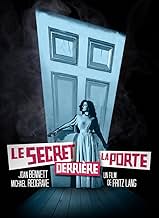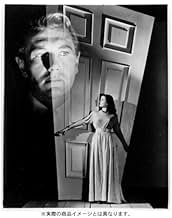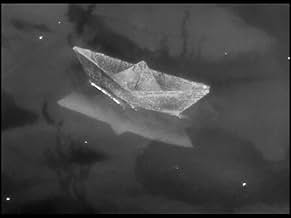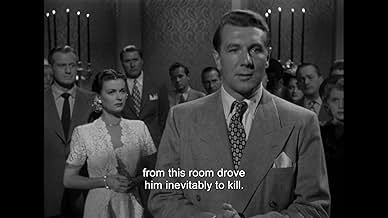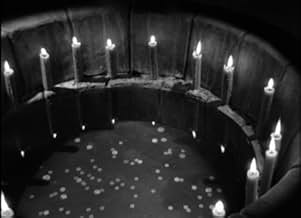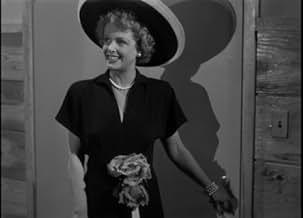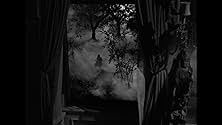अपनी भाषा में प्लॉट जोड़ेंAfter a lovely woman and her new husband settle in an ancient mansion on the East coast, she discovers that he may want to kill her.After a lovely woman and her new husband settle in an ancient mansion on the East coast, she discovers that he may want to kill her.After a lovely woman and her new husband settle in an ancient mansion on the East coast, she discovers that he may want to kill her.
- Altar Boy
- (बिना क्रेडिट के)
- Townsman
- (बिना क्रेडिट के)
- Sarah
- (बिना क्रेडिट के)
- Guest in Home Tour
- (बिना क्रेडिट के)
- Guest in Home Tour
- (बिना क्रेडिट के)
- Judge
- (बिना क्रेडिट के)
- Small Mexican Knife Fighter
- (बिना क्रेडिट के)
- Country Squire
- (बिना क्रेडिट के)
फ़ीचर्ड समीक्षाएं
The story, very loosely based on the old Bluebeard fairy tale, is interesting, but the pacing of the film is off, and you never really feel much tension. There are some interesting characters in the house, especially the secretary, but they aren't very developed. So much more could have been done in this area, to make it a truly great film.
Without giving anything away, I doubt many of us would have made the same decision that the main characters did in the end. But don't let that distract you from the truly beautiful fashion of this film.
What lies in room no.7? It is permanently locked and becomes Celia's object of curiosity. Also in the house are 3 slightly spooky other characters - Redgrave's sister Caroline (Anne Revere), his son David (Mark Dennis) from a previous marriage and his secretary Miss Robey (Barbara O'Neil). Its a good film, but I think if I was a woman I would have left him pretty early on in the relationship! While I could see where the film was heading, the actual ending is not what I expected. It's a spookily filmed story and it's quite memorable.
The story concerns a beautiful woman, Celia (Joan Bennett) who falls madly in love with a mysterious and moody man, Mark Lamphere (Michael Redgrave) whom she meets while on a trip. She goes to live with him at the family home, which is run by his sister (Anne Revere). It's there she discovers a few things. One is that Mark was married before, is a widower, and has a son (Mark Dennis). Mark also has a secretary (Barbara O'Neil) who covers one side of her face with a scarf to cover a scar from a fire. Mark, she finds, also has a wing where he houses a collection of rooms in which famous murders have taken place. There is one room, however, which is always kept locked. Celia wants to know what's beyond that door, and what makes her husband so moody.
"Beyond the Door" takes inspiration from two other Hitchcock films, Spellbound and Notorious, and taps into the postwar interest in psychology. There is a voice-over narration from the troubled Celia, who recounts her dreams. The film is very atmospheric, the music grand and suspenseful and, though one may be able to guess how it ends, the story is very intriguing. The ending, due to some narrative gaps, is somewhat disappointing.
This isn't Lang's best film but one can certainly see the master's touch in the gloom, the fixation on the door, and the cinematography. Joan Bennett (whom I saw in person and was unbelievably tiny) shines as she usually did under Lang's direction. She could play both sophisticated and glamorous as well as trashy and sweet-smart. Here, in a funny way, she combines both - the character is a bit of a classy femme fatale. Redgrave is properly passionate one minute and distant and a little weird the next. I would have loved to have seen someone like Dirk Bogarde tackle this role a few years later.
Derivative but very good.
I watched this on the back of positive reviews from a couple of people on this site; perhaps I should have read further though because I didn't find the wonderfully intelligent noir that they claimed to have seen. Perhaps these commentators have not seen the film Rebecca which sort of covers similar themes but does it much, much better than this film does, but for me I found it hard to care about this. Visually I liked it and credit to Lang because his direction and work with his cinematographer does produce some really well set up scenes that do have great atmosphere. However this is not repeated in the material which is not as intelligent as it would like to think itself. Indeed it is terribly overwrought and melodramatic and offers little to counter it.
As a result the cast have to thanklessly play it up the best they can. I thought than Bennett did as good a job as she could have hoped to have done. She isn't brilliant though but she plays detective well. More important but not much cop is Redgrave; OK the blame lies more on the material than in his performance but given how little was conveyed by words at times, his performance was important but not up to the task.
Overall then, a fairly overdone melodrama that doesn't really convince in how it uses psychoanalysis to inform and direct its narrative. It may look great but the substance just isn't there from the start right down to the insultingly simplistic final scene.
Joan Bennett plays Celia, a young lady who acquires a large amount of money after her brother's death and decides to take a holiday. It is here that she meets Mark Lamphere (Michael Redgrave), a mysterious and charming gentleman who excites in Celia intense suppressed feelings of rebellion and exhilaration. Following their marriage, a hastily-decided proposition that can only lead to trouble, Celia immediately begins to notice peculiarities in her new husband, and, after her arrival at Mark's extravagant residence, she finds the dwelling haunted by the shadow of his previous wife. Mark, it seems, houses an unhealthy preoccupation with murder, and has made a hobby out of collecting entire rooms in which unspeakable atrocities of passion were committed. But what of the one room that is kept securely locked, never to be opened by anyone? Celia concludes that the secret to unlocking the inner depths of her husband's disturbed mind lies within that single room, beyond the forbidden door. Though Silvia Richards' screenplay, from a story by Rufus King, often seems too incredible to take seriously, Lang's film remains an interesting achievement, and is nothing if not entertaining.
I found the promotional material for 'Secret Beyond the Door' to be grossly misleading. The image of Joan Bennett standing before a significantly-distorted door prompted me to expect a film of extreme German Expressionism, in the same vein as 'The Cabinet of Dr. Caligari (1920).' Fritz Lang, who developed his career in Germany during the 1920s, and having often used elements of the style, would presumably have been very adept at recreating the devilishly-twisted labyrinths of the human mind, but the only scene to even approach my stylistic expectations was the appropriately ambiguous and shadowy dream sequence, in which Michael Redgrave both prosecutes and defends his malevolent tendencies in court {this particular scene may even have influenced Hitchcock's heavily-stylised courtroom trial in 'Dial M for Murder (1954)}. The remainder of the film has the appearance of a typical 1940s film noir, with suitably shadowy cinematography by Stanley Cortez, supplemented by a voice-over by Joan Bennett. Also note the similarity between the character of Miss Robey (Barbara O'Neil) and Mrs. Danvers (Judith Anderson) from 'Rebecca,' most particularly in their respective final actions in each picture.
क्या आपको पता है
- ट्रिवियाThe grove of trees through which Celia (Joan Bennett) runs when she flees the house is the same grove through which the Wolf Man ran in The Wolf Man (1941), also made by Universal. In particular, the tree, against which she leans, is the same one under which the Wolf Man was beaten.
- गूफ़When Celia takes an impression of the key in wax, she only takes the impression on one side, which would render the key made from that impression useless without the reverse side.
- भाव
Mark Lamphere: You were living that fight. You soaked it all in - love, hate, the passion. You've been starved for feelings - any real feelings. I thought: 20th Century Sleeping Beauty. Wealthy American girl who has lived her life wrapped in cotton wool but she wants to wake up. Maybe she can.
Celia Barrett: Is it as hard as all that?
Mark Lamphere: Most people are asleep.
- कनेक्शनFeatured in Vampira: Secret Beyond the Door... 1947 (1956)
टॉप पसंद
- How long is Secret Beyond the Door...?Alexa द्वारा संचालित
विवरण
- रिलीज़ की तारीख़
- कंट्री ऑफ़ ओरिजिन
- भाषाएं
- इस रूप में भी जाना जाता है
- Secret Beyond the Door
- फ़िल्माने की जगहें
- उत्पादन कंपनी
- IMDbPro पर और कंपनी क्रेडिट देखें
बॉक्स ऑफ़िस
- बजट
- $15,00,000(अनुमानित)
- चलने की अवधि1 घंटा 39 मिनट
- रंग
- पक्ष अनुपात
- 1.33 : 1
इस पेज में योगदान दें


